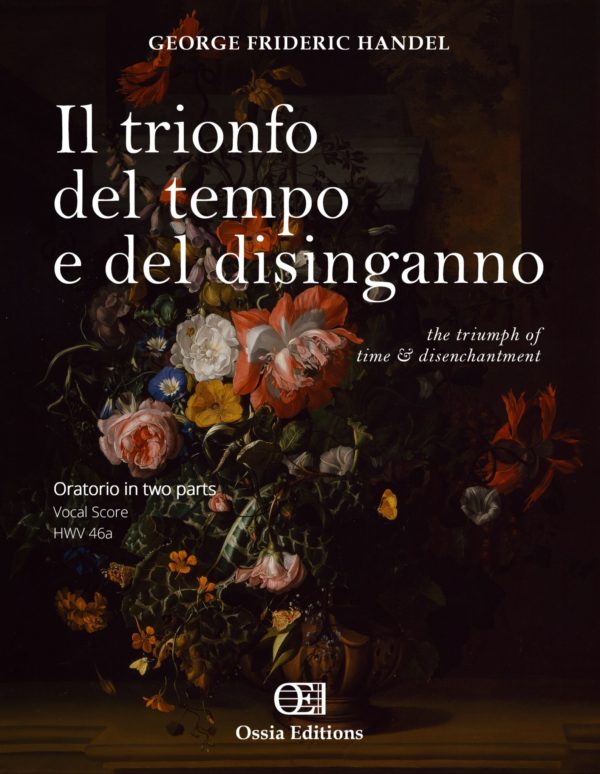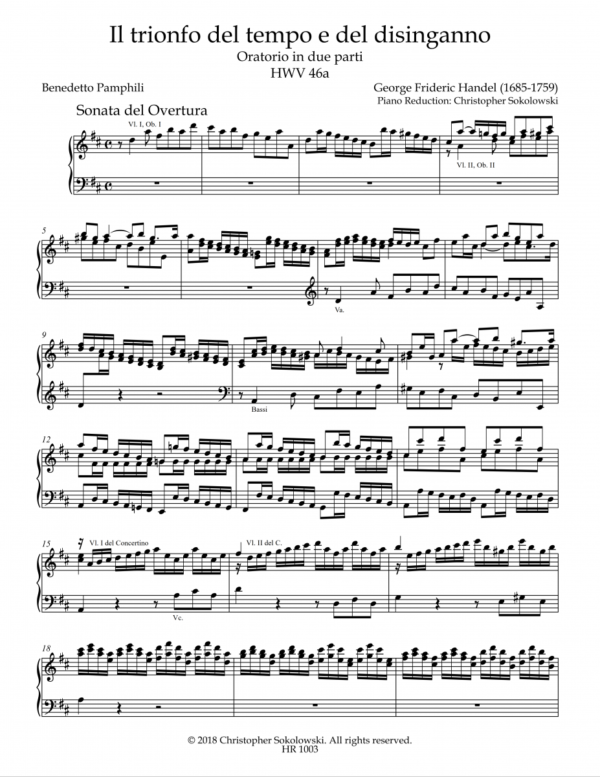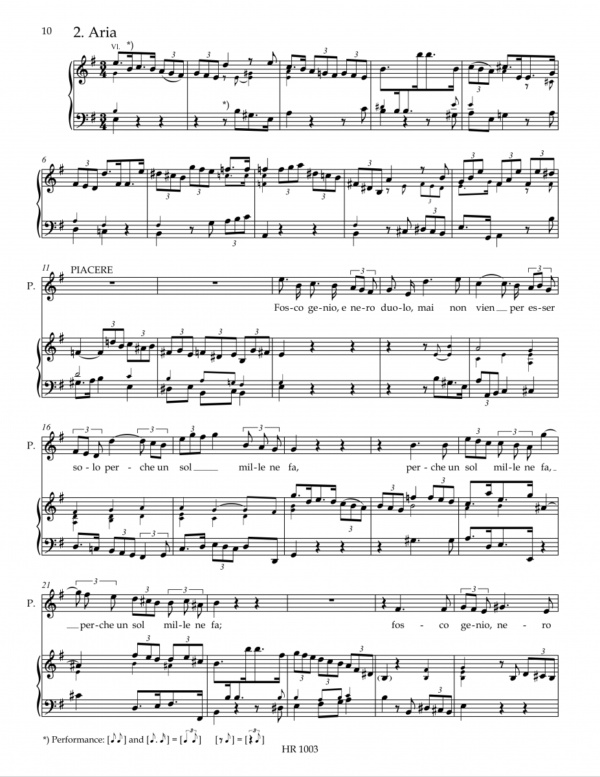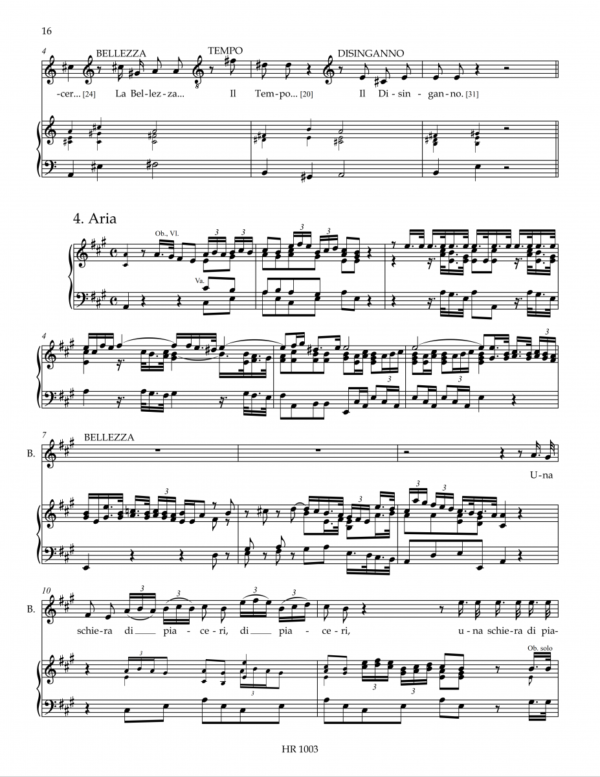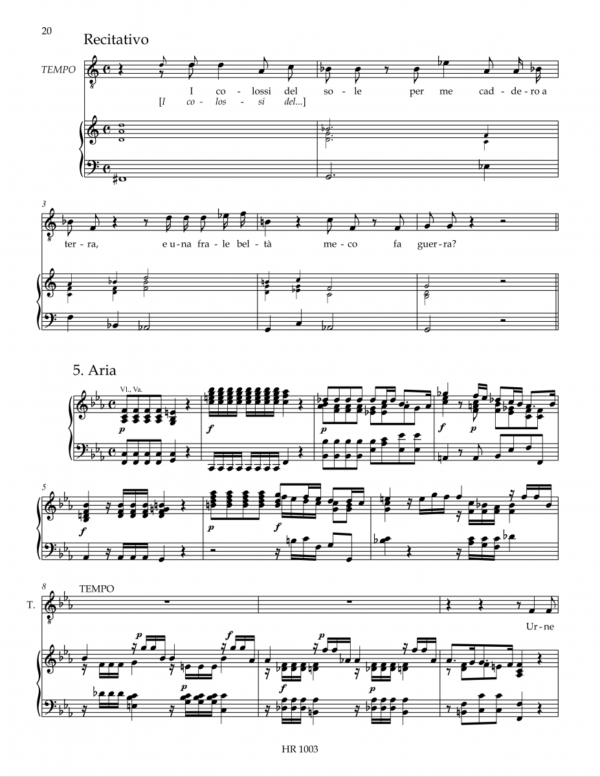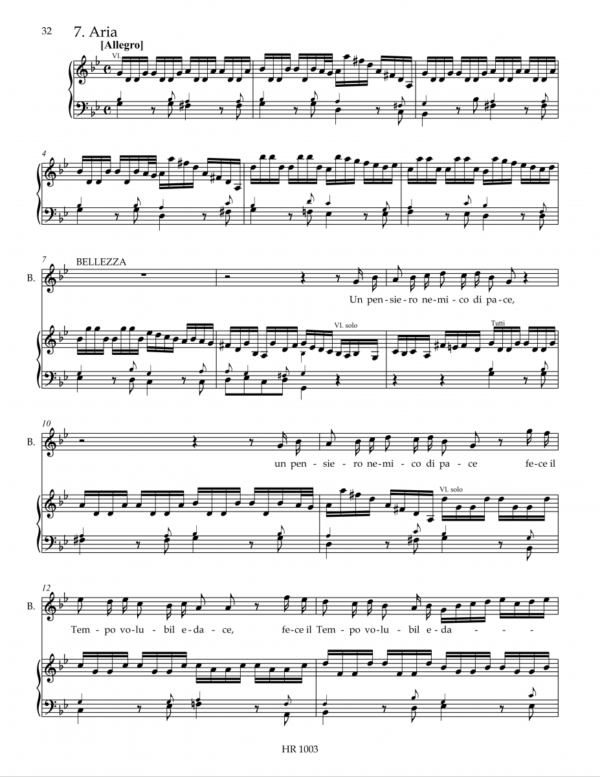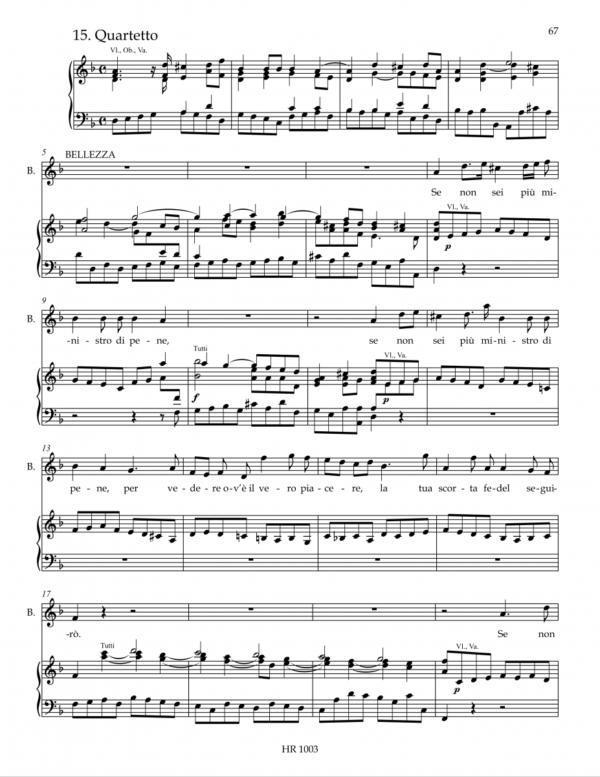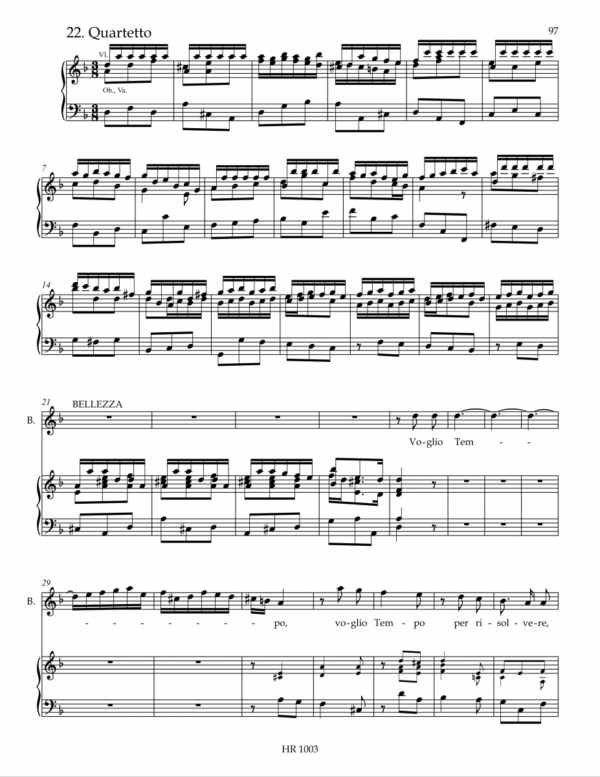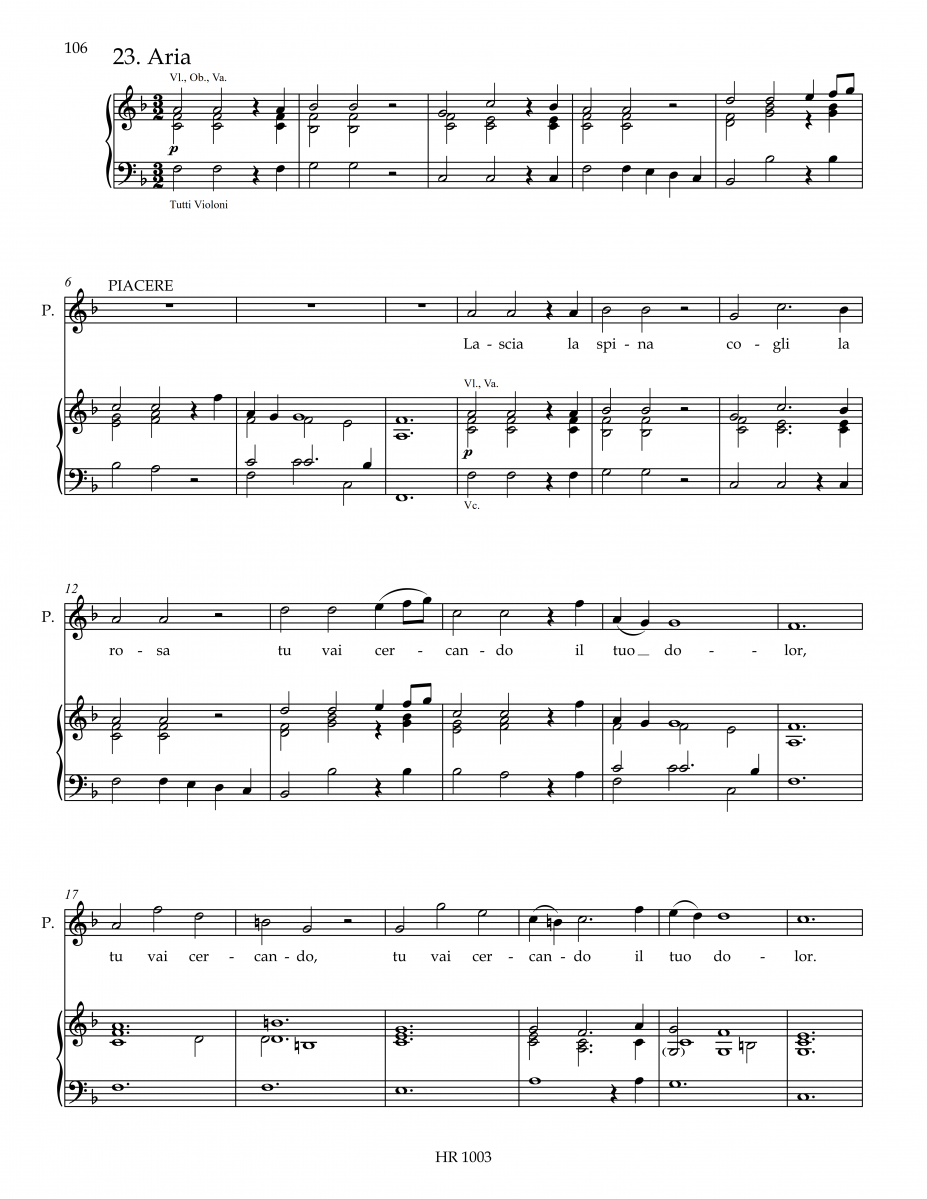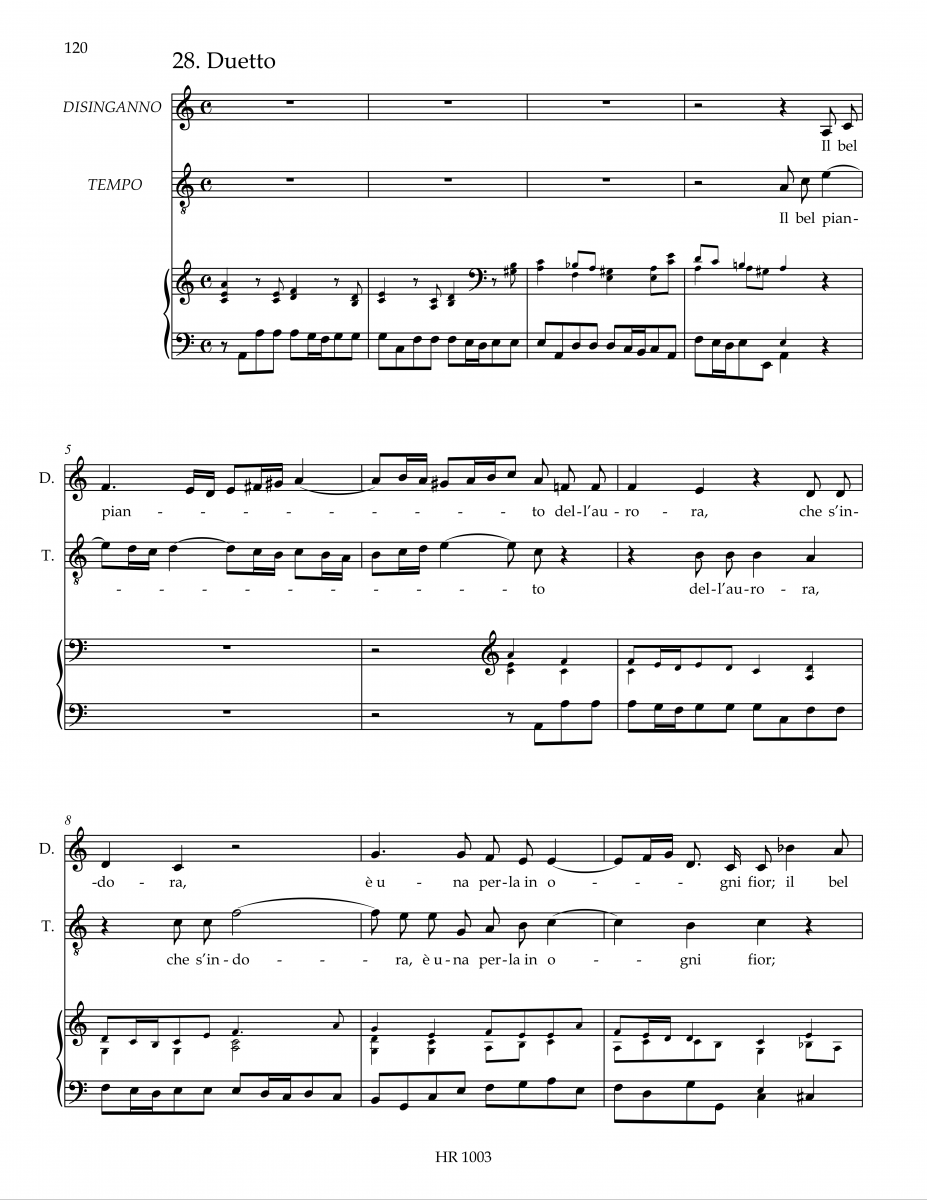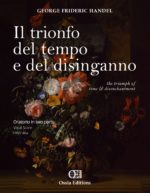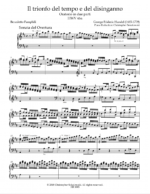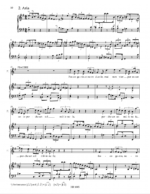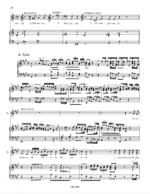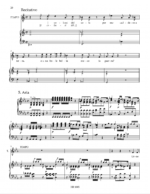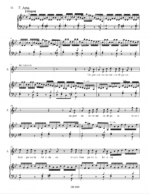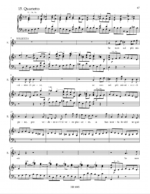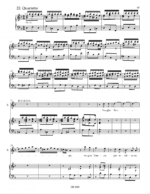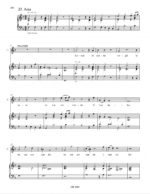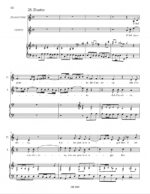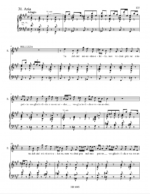Il trionfo del tempo e del disinganno, HWV 46a
Bellezza, soprano
Piacere, soprano or mezzosoprano
Disinganno, alto
Tempo, tenor
Oratorio in two parts
Piano/vocal score
Edition: HR 1003
ISMN: 979-0-800140-00-6 (Revised June 2018)
The first ever vocal score (piano reduction) of Handel’s first oratorio, Il trionfo del tempo e del disinganno, HWV 46a. It is based on Friedrich Chrysander’s edition of Il trionfo del tempo e del disinganno (HWV 46a), produced by the German Handel Society (HG 24), and a 1707 manuscript of the work largely in the hand of Handel’s main copyist, Giuseppe Antonio Angelini.
Contents: Preface, Text and English translation, Index of numbers, Sonata del Overtura, Parte prima, Parte seconda
Backround: Handel’s Il trionfo del tempo e del disinganno (The Triumph of Time and Disenchantment) had its premiere performance in Rome in the first few months of 1707 at one of the residences of the librettist of the work, Cardinal Benedetto Pamphili. Pamphili was one of Handel’s first patrons when he arrived in Italy, and additionally provided text for several of Handel’s Italian cantatas. Handel was only 22 years old when he wrote Trionfo, and only having been in Italy for a brief time, one can hear already the great influence of Roman music on his compositional style. The score featured the extreme virtuosic ability and superb gracefulness of Arcangelo Corelli, the leading violinist of the Ottoboni orchestra for which Handel was writing. While the work is known as an oratorio, the story is not directly religious in subject; a more accurate label would be “moral cantata,” as the plot deals with the conflict between earthly pleasures and divinity. The work was revised twice in the composers lifetime, in 1737 and 1757, but this original version remains the most spectacular.
Synopsis: Bellezza (Beauty) knows that one day her beauty will fade, but Piacere (Pleasure) tries to convince her otherwise, promising her eternal beauty. Tempo (Time) and Disinganno (Disenchantment) together insist that, like a flower, beauty and the charms of youth do not last. Bellezza continues to wrestle with her conscience, being pulled in opposite directions by Piacere, Tempo, and Disinganno. Ultimately she sees the truth, and frees herself from vain pleasures, turning her heart to God.
Contents
Sonata del Overtura
PARTE PRIMA
Aria Fido specchio — Bellezza
Recitativo Io che sono il Piacere — Piacere, Bellezza
Aria Fosco genio, e nero duolo — Piacere
Recitativo Ed io che il Tempo sono — Tempo, Disinganno
Aria Se la Bellezza perde vaghezza — Disinganno
Recitativo Dunque si prendan l’armi — Piacere, Bellezza, Tempo, Disinganno
Aria Una schiera di Piaceri — Bellezza
Recitativo I colossi del sole — Tempo
Aria Urne voi! che racchiudete tante belle — Tempo
Recitativo Sono troppo crudeli i tuoi consigli — Piacere
Duetto Il voler nel fior degl’anni — Bellezza, Piacere
Recitativo Della vita mortale — Disinganno, Bellezza
Aria Un pensiero nemico di pace — Bellezza
Recitativo Folle, tu nieghi il Tempo — Disinganno, Piacere, Bellezza
Aria Nasce l’uomo, ma nasce bambino — Tempo
Aria L’uomo sempre se stesso distrugge — Disinganno
Recitativo Questa è la reggia mia — Piacere
Sonata e recitativo Taci: qual suono ascolto? — Bellezza
Aria Un leggiadro giovinetto — Piacere
Recitativo Ha nella destra l’ali — Bellezza
Aria Venga il Tempo — Bellezza
Aria Crede l’uom ch’egli riposi — Disinganno
Recitativo Tu credi che sia lungi — Tempo, Bellezza
Aria Folle, dunque tu sola presumi — Tempo
Recitativo La reggia del Piacer vedesti — Disinganno, Tempo
Quartetto Se non sei più ministro di pene — Bellezza, Piacere, Disinganno, Tempo
PARTE SECONDA
Recitativo Se del falso Piacere — Tempo
Aria Chiudi, chiudi i vaghi rai — Piacere
Recitativo In tre parti divise — Tempo
Aria Io sperai trovar nel vero — Bellezza
Recitativo Tu vivi invan dolente — Piacere
Aria Tu giurasti di mai non lasciarmi — Piacere
Recitativo Sguardo, che infermo ai rai — Tempo
Aria e recitativo Io vorrei due cori in seno — Bellezza, Disinganno
Recitativo Io giurerei, che tu chiudesti — Disinganno, Bellezza
Aria Più non cura valle oscura — Disinganno
Recitativo È un ostinato errore — Tempo
Aria È ben folle quel nocchier — Tempo
Recitativo Dicesti il vero — Bellezza
Quartetto Voglio Tempo per risolvere — Bellezza, Tempo, Disinganno, Piacere
Recitativo Presso la reggia — Bellezza, Disinganno
Aria Lascia la spina — Piacere
Recitativo Con troppo chiare note — Bellezza, Disinganno
Aria Voglio cangiar desio — Bellezza
Recitativo Or che tiene la destra — Bellezza, Piacere, Disinganno
Aria Chi già fu del biondo crine — Disinganno
Recitativo Ma che veggio, che miro? — Bellezza
Aria Ricco pino, nel cammino — Bellezza
Accompagnato Sì, bella penitenza — Bellezza
Duetto Il bel pianto dell’aurora Tempo, — Disinganno
Ritornello
Recitativo Piacer, che meco già vivesti — Bellezza
Aria Come nembo che fugge col vento — Piacere
Accompagnato Pure del cielo — Bellezza
Aria Tu del ciel ministro eletto — Bellezza

